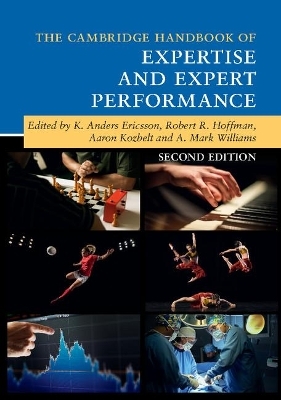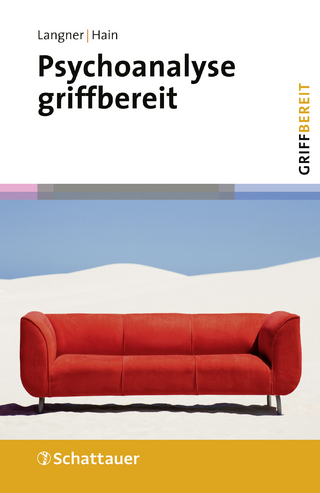
The Cambridge Handbook of Expertise and Expert Performance
Cambridge University Press (Verlag)
978-1-316-50261-7 (ISBN)
In this updated and expanded edition of The Cambridge Handbook of Expertise and Expert Performance, some of the world's foremost experts on expertise share their scientific knowledge of expertise and expert performance and show how experts may differ from non-experts in terms of development, training, reasoning, knowledge, and social support. The book reviews innovative methods for measuring experts' knowledge and performance in relevant tasks. Sixteen major domains of expertise are covered, including sports, music, medicine, business, writing, and drawing, with leading researchers summarizing their knowledge about the structure and acquisition of expert skills and knowledge, and discussing future prospects. General issues that cut across most domains are reviewed in chapters on various aspects of expertise, such as general and practical intelligence, differences in brain activity, self-regulated learning, deliberate practice, aging, knowledge management, and creativity.
K. Anders Ericsson is currently the Conradi Eminent Scholar and Professor of Psychology at Florida State University. He is also a Fellow of the Center for Advanced Study in the Behavioral Sciences, the American Psychological Association, the Association for Psychological Science, and a member of the Royal Swedish Academy of Engineering Sciences. His research has been featured in cover stories in Scientific American, Time, Fortune, the Wall Street Journal and the New York Times. He has been invited to give keynote presentations at conferences of surgeons, musicians, teachers, clinical psychologists, athletes, and coaches as well as professional sports organizations, such as the Philadelphia Eagles, the San Antonio Spurs, and Manchester City. Robert R. Hoffman is a recognized world leader in cognitive systems engineering and human-centered computing. Currently he is senior research scientist at the Institute for Human and Machine Cognition in Pensacola. He is a fellow of the Association for Psychological Science, fellow of the Human Factors and Ergonomics Society, senior member of the Association for the Advancement of Artificial Intelligence, and a Fulbright scholar. His Ph.D. is in experimental psychology from the University of Cincinnati. His Postdoctoral Associateship was at the Center for Research on Human Learning at the University of Minnesota. He also served on the faculty of the Institute for Advanced Psychological Studies at Adelphi University, New York. Hoffman has been recognized internationally in psychology, remote sensing, human factors engineering, intelligence analysis, weather forecasting, and artificial intelligence – for his research on the psychology of expertise, the methodology of cognitive task analysis, HCC issues for intelligent systems technology, and the design of macrocognitive work systems. Aaron Kozbelt is Professor of Psychology at Brooklyn College and the Graduate Center of the City University of New York. His research focuses on creativity and cognition in the fine arts, with an emphasis on perception in visual artists, lifespan creativity in composers, and evolutionary aspects of aesthetics and creativity. He has published more than 80 peer-reviewed articles and book chapters, and his research has been funded by the National Science Foundation. He serves on several editorial boards and has received several national and international awards for his research, including the Daniel Berlyne Award from Division 10 of the American Psychological Association and the Alexander Gottlieb Baumgarten Award from the International Association of Empirical Aesthetics. Andrew Mark Williams is Professor and Chair of the Department of Health, Kinesiology, and Recreation at the University of Utah. He is a fellow of the British Psychological Society, the British Association of Sport and Exercise Science, and the European College of Sports Science. His research interests focus on the neural and psychological mechanisms underpinning the acquisition and development of perceptual-cognitive and perceptual-motor skills. He has published over 300 journal articles and book chapters, and has written or edited 15 books. He is Editor-in-Chief for the Journal of Sports Science and sits on the editorial boards of several prominent journals. His research has been funded by research councils in Australia and the UK, by industrial partners such as Nike, and by several professional sports teams and national and international governing bodies.
Part I. Introduction and Perspectives: 1. An introduction to the 2nd Edition of the Cambridge Handbook of Expertise and Expert Performance: its development, organization, and content; 2. A sociological/philosophical perspective on expertise: the acquisition of expertise through socialization; 3. Re-framing expertise and its development: a lifeworld perspective; 4. The evolution of expertise; 5. Expertise in other non-human animals: canines as an example; Part II. Overview of Approaches to the Study of Expertise: Brief Historical Accounts of Theories and Methods; 6. Studies of expertise from psychological perspectives: historical foundations and recurrent themes; 7. Expert systems: a perspective from computer science; 8. Developing occupational expertise through everyday work activities and interactions; 9. Professionalism, science, and expert roles: a social perspective; Part III. Methods for Studying the Structure of Expertise: 10. Perception in expertise; 11. Eliciting and representing the knowledge of experts; 12. Capturing expert thought with protocol analysis: concurrent verbalizations of thinking during experts' performance on representative tasks; 13. Methods for studying the structure of expertise: psychometric approaches; 14. Studies of the activation and structural changes of the brain associated with expertise; Part IV. Methods for Studying the Acquisition and Maintenance of Expertise: 15. Collecting and assessing practice activity data: concurrent, retrospective and longitudinal approaches; 16. Multidisciplinary longitudinal studies: a perspective from the field of sports; 17. Using cases to understand expert performance: method and methodological triangulation; 18. Historiometric methods; Part V. Domains of Expertise; Section 1. Professional Domains: 19. Expertise in medicine and surgery; 20. Expertise and transportation; 21. Expertise in professional design; 22. Toward deliberate practice in the development of entrepreneurial expertise: the anatomy of the effectual ask; 23. Professional writing expertise; 24. Expertise and expert performance in teaching; 25. Expert professional judgments and 'naturalistic decision making'; 26. Decision making skill: from intelligence to numeracy and expertise; 27. What makes an expert team? A decade of research; Section 2. Arts, Sports, Games and Other Types of Expertise: 28. Expertise in music; 29. Brain changes associated with acquisition of musical expertise; 30. Expertise in drawing; 31. Expertise in chess; 32. Mathematical expertise; 33. Expertise in L2 vocabulary; 34. Expertise in sport: specificity, plasticity and adaptability in high-performance athletes; Part VI. Generalizable Mechanisms Mediating Types of Expertise; 35. Superior anticipation; 36. Superior working memory in experts; 37. Expertise and situation awareness; Part VII. General Issues and Theoretical Frameworks; 38. The differential influence of experience, practice, and deliberate practice on the development of superior individual performance of experts; 39. Practical intelligence and tacit knowledge: an ecological view of expertise; 40. Cognitive load and expertise reversal; 41. Expertise and structured imagination in creative thinking: reconsideration of an old question; 42. Aging and expertise.
| Erscheint lt. Verlag | 17.5.2018 |
|---|---|
| Reihe/Serie | Cambridge Handbooks in Psychology |
| Zusatzinfo | 15 Tables, black and white; 12 Halftones, black and white; 63 Line drawings, black and white |
| Verlagsort | Cambridge |
| Sprache | englisch |
| Maße | 174 x 247 mm |
| Gewicht | 1590 g |
| Themenwelt | Geisteswissenschaften ► Psychologie ► Allgemeine Psychologie |
| Geisteswissenschaften ► Psychologie ► Sozialpsychologie | |
| Geisteswissenschaften ► Psychologie ► Verhaltenstherapie | |
| ISBN-10 | 1-316-50261-9 / 1316502619 |
| ISBN-13 | 978-1-316-50261-7 / 9781316502617 |
| Zustand | Neuware |
| Haben Sie eine Frage zum Produkt? |
aus dem Bereich


